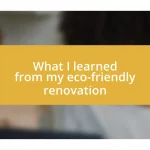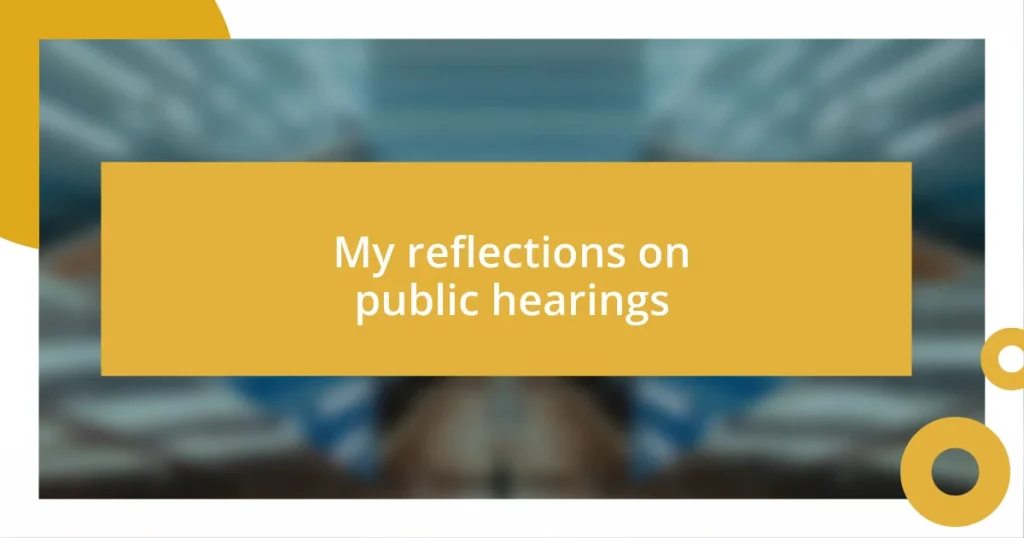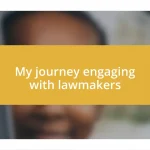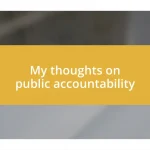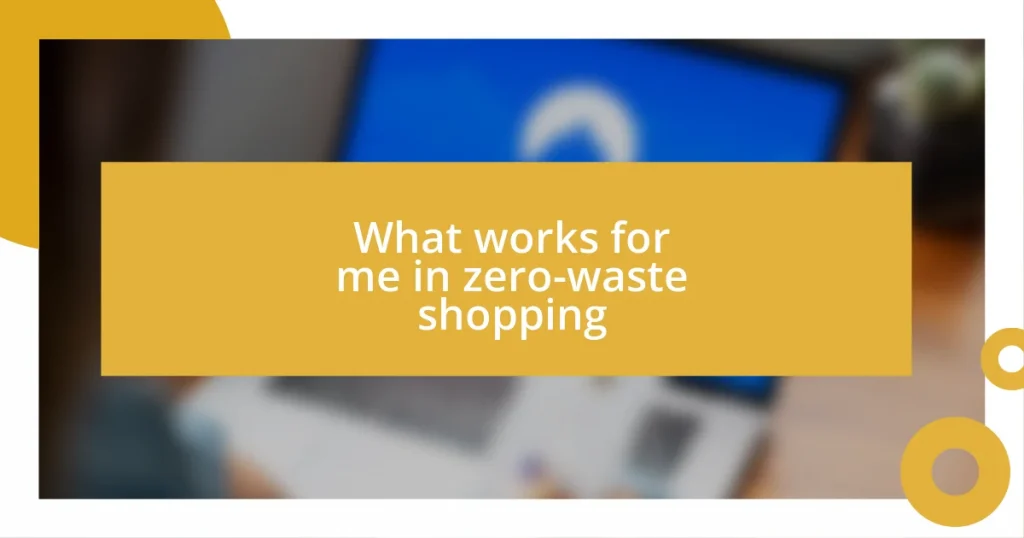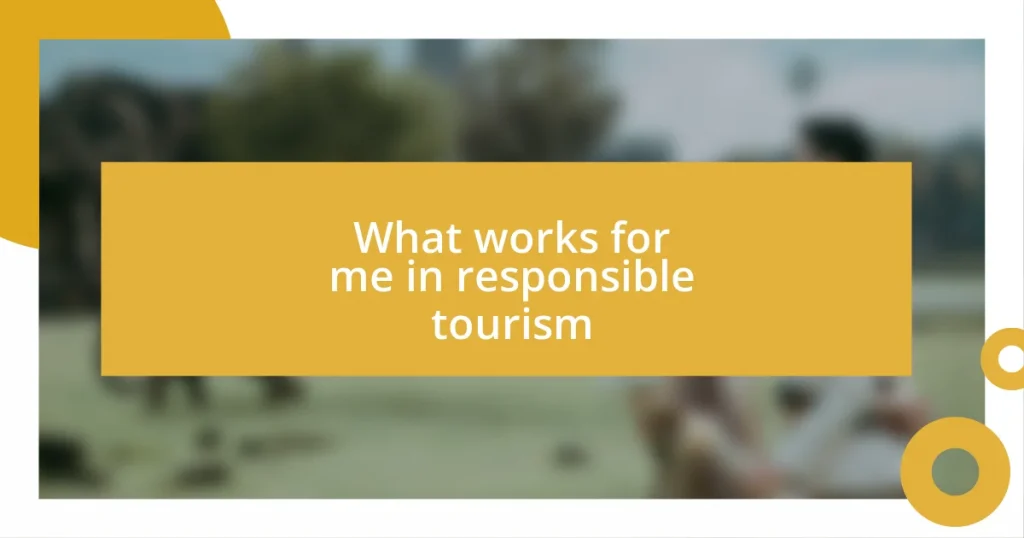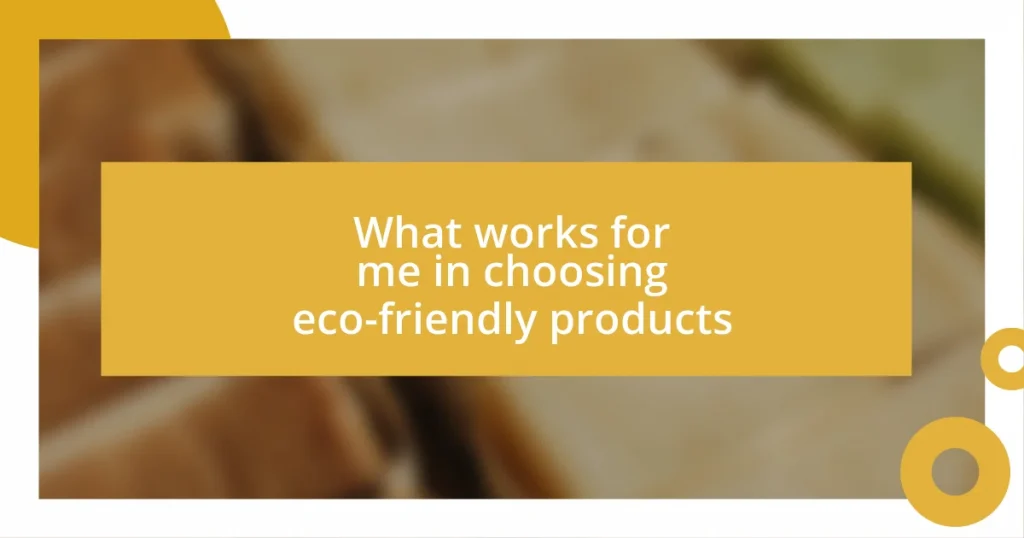Key takeaways:
- Public hearings empower citizens to actively participate in democracy, enabling them to voice concerns and shape community decisions.
- Effective listening and respectful dialogue are crucial for fostering understanding and meaningful exchanges during public hearings.
- Building relationships with decision-makers and following up after hearings can significantly enhance the impact of one’s opinions and foster ongoing conversations.
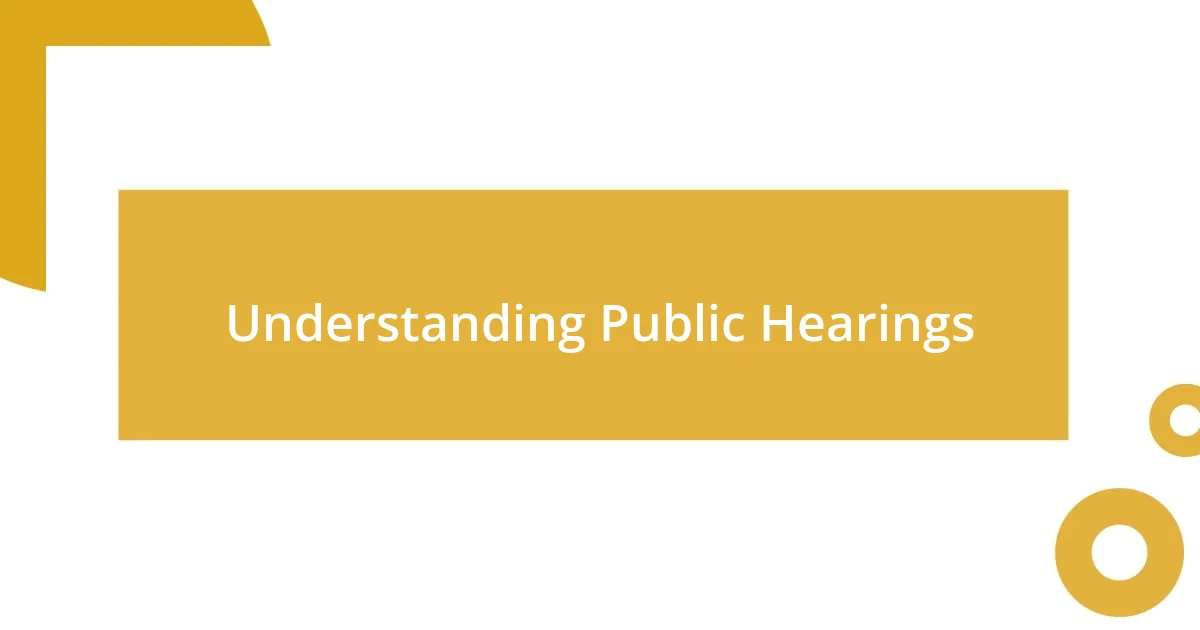
Understanding Public Hearings
Public hearings are fascinating windows into the democratic process, allowing citizens to voice their opinions on various issues. I remember attending my first public hearing; the energy in the room was palpable, filled with anticipation and passion. It struck me how vital these sessions are—do we truly grasp the power we hold when we share our thoughts?
During these gatherings, community members can express concerns, support initiatives, or challenge proposals directly to decision-makers. I often wonder: how many profound changes stem from a well-crafted plea or a pointed question raised in a public hearing? Being part of that dialogue was inspiring and gave me a sense of agency I hadn’t experienced before.
Moreover, public hearings serve not only as platforms for discussion but also as demonstrations of transparency in governance. I’ve seen individuals genuinely move officials with heartfelt stories, reminding me that behind every statistic is a human experience. This connection between people and policymakers can foster a healthier, more responsive government—could there be a better way to engage with the complexities of our communities?
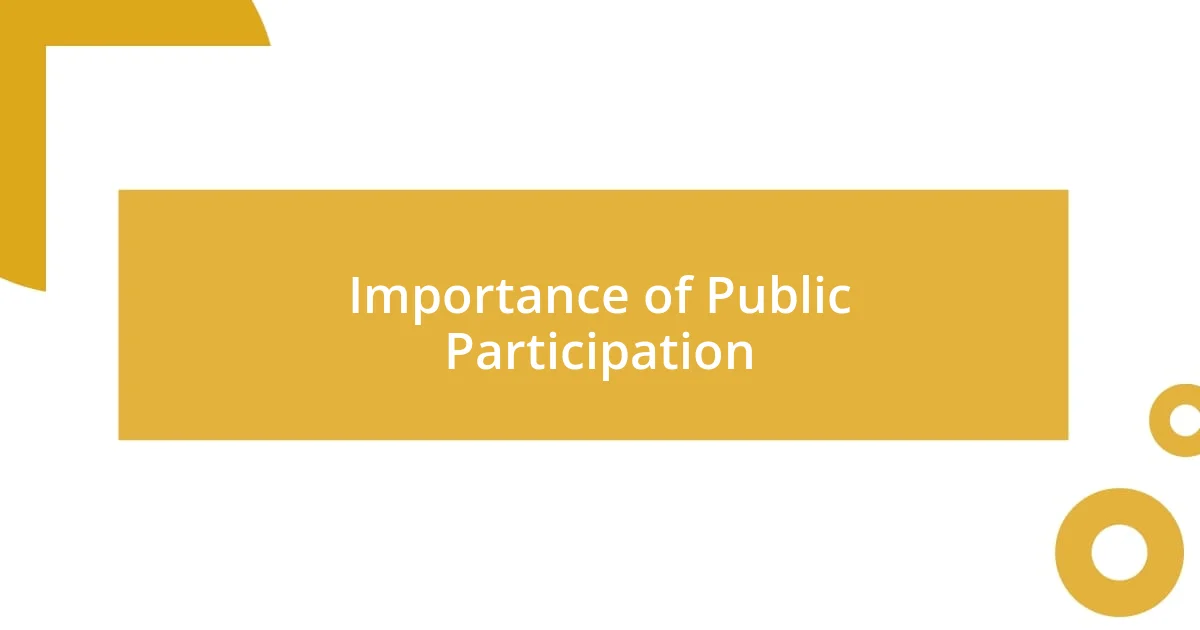
Importance of Public Participation
Public participation is more than just a formality; it’s the heartbeat of democracy. When I was at a recent public hearing, I was struck by the diverse voices echoing in the room. Each participant brought a unique story, and seeing how this collective engagement could sway local decisions reminded me just how powerful our individual contributions can be. I felt a sense of belonging, realizing that when we share our perspectives, we not only inform but also shape our community’s future.
Why does this matter? Here are a few key reasons:
- Empowerment: Every voice counts, and participating empowers citizens by giving them a stake in the decision-making process.
- Accountability: Decision-makers are more likely to be accountable when they know their constituents are actively involved and paying attention.
- Trust Building: Public participation fosters trust between the community and its leaders, making governance more collaborative.
- Informed Decisions: Many complex issues require diverse insights; public input ensures that a wider array of perspectives informs the final decisions.
- Community Solidarity: Engaging together creates a sense of community, uniting individuals around common goals and concerns.
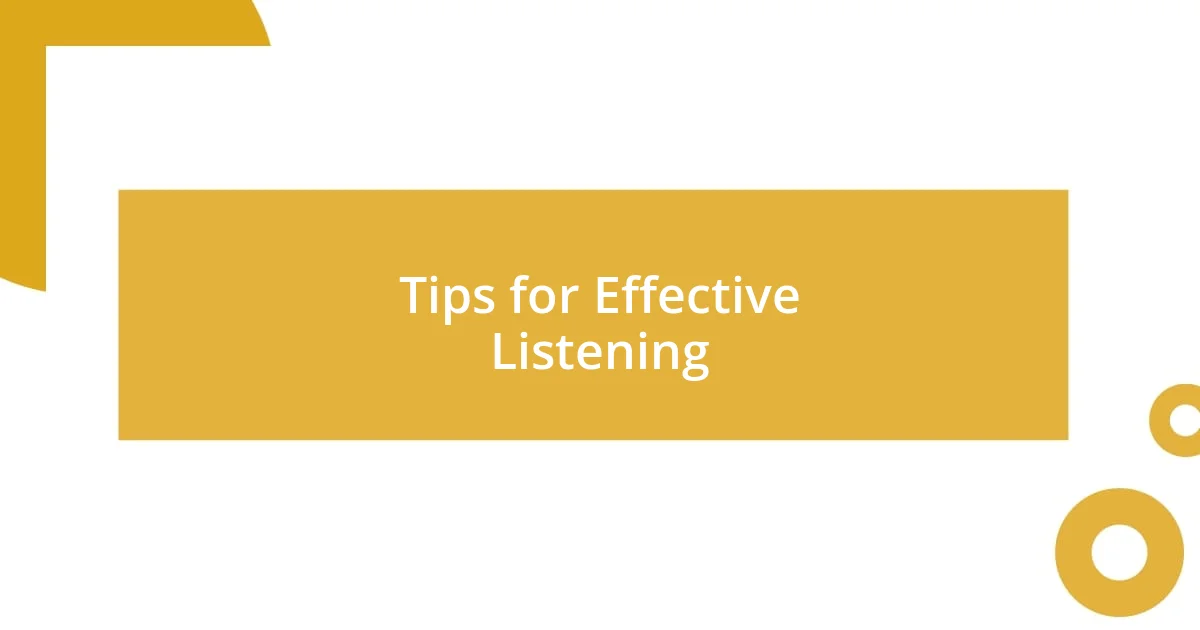
Tips for Effective Listening
Listening during a public hearing is more than just hearing words; it’s about absorbing the sentiments behind them. I recall sitting quietly at a hearing, feeling the weight of each testimony. One particular speaker’s story resonated deeply with me, sparking a fire in my own convictions. This experience taught me that effective listening requires an open heart and mind, ready to connect with the emotions and intentions of speakers.
It’s also essential to practice active listening. This means not only focusing on what’s being said but also how it’s expressed—body language, tone, and pauses all convey critical messages. I’ve learned to take notes during these sessions to retain key points and emotions shared. When I revisit those notes later, I often discover new layers of meaning, reflecting the complexity of community voices that deserve attention.
Lastly, fostering an environment of respect is key. When attending a public hearing, I always remind myself to remain empathetic and considerate towards each speaker’s perspective, regardless of whether I agree with them. I’ve seen firsthand how negative reactions can silence valuable discussions, and I actively choose to approach every testimony with an open mind. This approach not only enhances my own understanding but also encourages a richer dialogue in the room.
| Tip | Description |
|---|---|
| Open Heart and Mind | Be receptive to the emotions and intentions behind the speakers’ words. |
| Active Listening | Focus on verbal and non-verbal cues; take notes to capture key points. |
| Foster Respect | Approach each perspective with empathy to promote richer dialogue. |
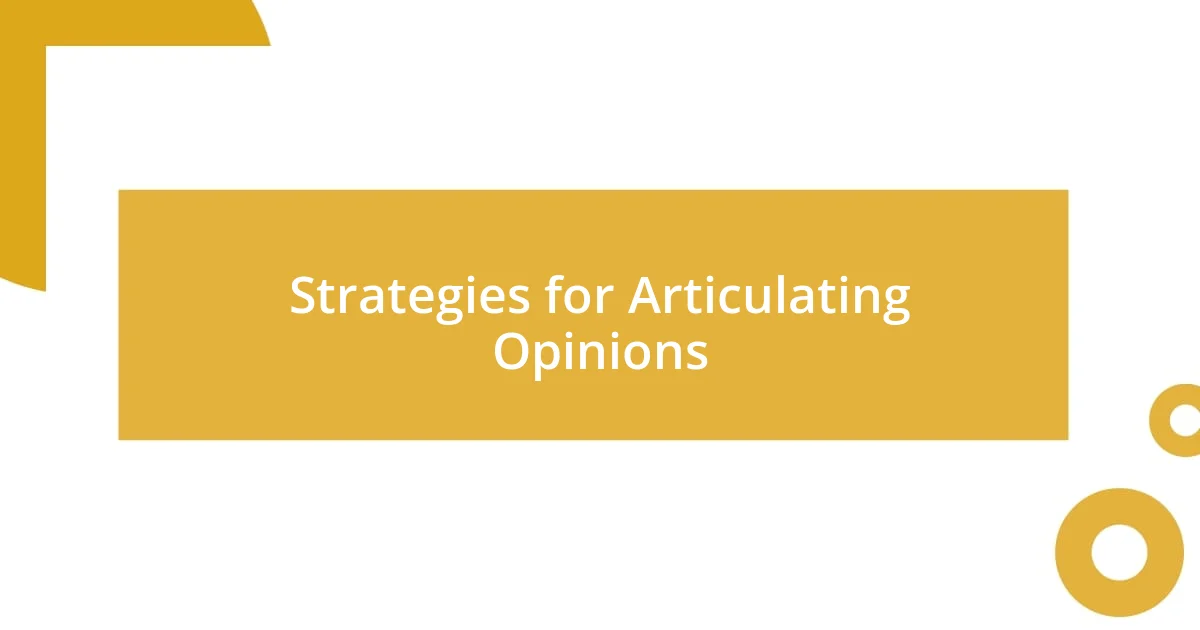
Strategies for Articulating Opinions
To effectively articulate your opinions during public hearings, it’s crucial to organize your thoughts beforehand. I’ve found that jotting down key points not only clarifies my stance but also helps me remain focused while speaking. Have you ever felt overwhelmed in the moment, only to forget what you wanted to say? Trust me, having a clear outline can make all the difference.
Another strategy that works wonders is using relatable anecdotes. When I shared a personal story at a recent hearing, I could see people lean in, captivated. It reminded me that connecting my experiences to larger issues not only draws attention but also makes my opinion resonate on a deeper level with others. Isn’t it amazing how sharing a piece of ourselves can create bridges of understanding?
Finally, pay attention to your tone and delivery. I remember speaking too quickly out of nerves once and instantly losing my audience’s engagement. Slowing down and varying my tone transformed my message, drawing in listeners and making my opinions more persuasive. How many times have you missed a valuable point simply because the delivery wasn’t compelling? It’s a small adjustment that can create a significant impact.
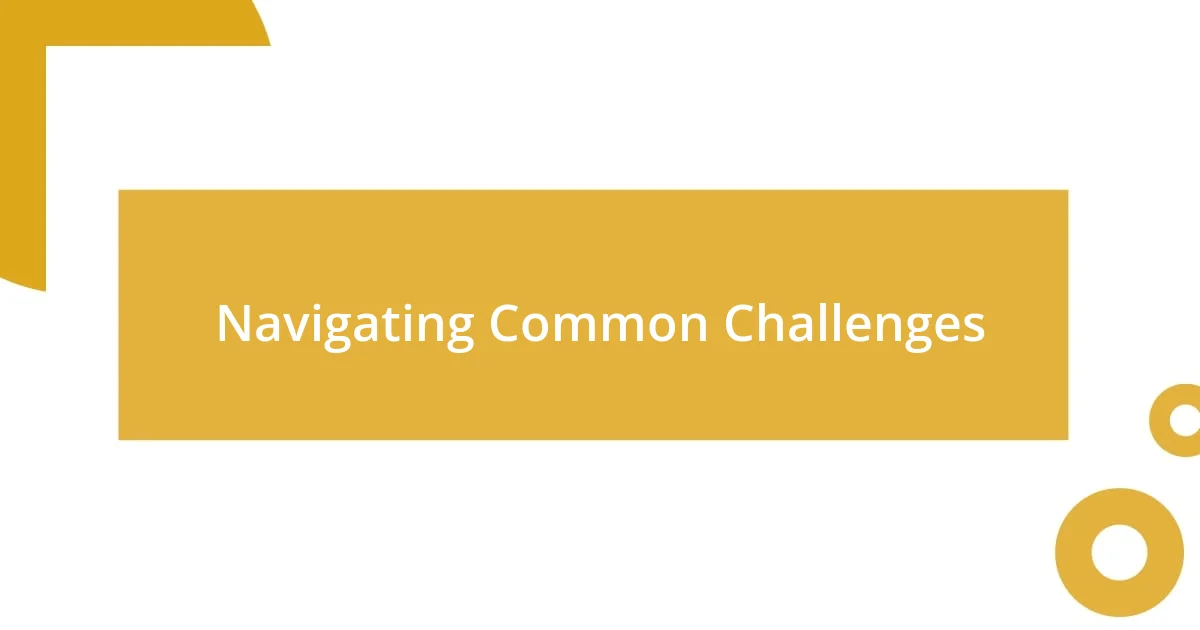
Navigating Common Challenges
Experiencing public hearings can bring about certain challenges that many attendees face. One notable challenge I’ve encountered is the anxiety of speaking in front of a crowd. During one particular hearing, my heart raced as my turn approached, and I found myself second-guessing my thoughts. It was a wake-up call for me to remember that everyone in the room shared a common goal; we were all there to discuss issues that matter deeply to us. I realized that embracing vulnerability is part of the process, and it can actually foster connection with others in similar situations.
Another difficulty revolves around differing opinions and potential conflicts in the room. I’ve witnessed heated exchanges that can overshadow the core issues at hand. In those moments, I’ve made it a point to remind myself of the importance of staying composed. Choosing to respond thoughtfully, rather than reactively, not only preserves the integrity of the discussion but also encourages a more respectful dialogue. Have you ever noticed how a calm demeanor can sometimes defuse tension? I’ve seen it transform a potentially volatile exchange into a constructive conversation.
Navigating the technical jargon often used in public hearings can feel overwhelming, too. I remember attending a session filled with complex terms that left me scratching my head. The key for me was to ask questions respectfully, seeking clarification without hesitation. I found that most speakers appreciated my inquiries, and it opened up richer discussions. It’s essential to remind ourselves that our understanding should never be compromised by our lack of familiarity with certain terms; asking questions is how we learn and grow in these settings.
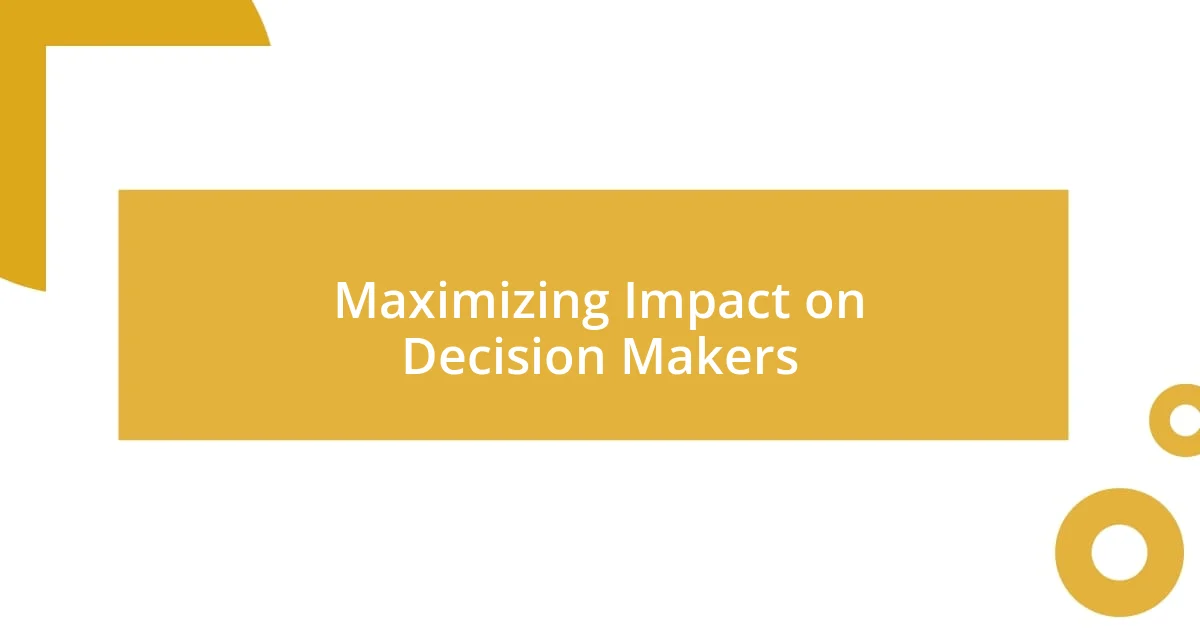
Maximizing Impact on Decision Makers
When trying to maximize my impact on decision makers during public hearings, I’ve learned that timing is everything. At one hearing, I noticed how a well-timed comment right after a key point made by a decision maker could amplify my message. Have you ever found that perfect moment when your words seem to resonate even more? It’s like catching a wave — riding it can elevate your message and keep it top of mind for those who matter.
Building relationships before the hearing can make a world of difference. I remember attending a community event where I casually chatted with a few decision makers in attendance. Later, when I spoke at the hearing, it felt like they were more receptive to my points because we had already connected. Isn’t it fascinating how personal connections can pave the way for a more impactful dialogue? The effort to foster these relationships can turn a solo voice into part of a meaningful conversation.
Lastly, follow-up matters immensely. After sharing my viewpoint at a recent hearing, I made it a point to send a thoughtful email thanking the decision makers for their time and reiterating my key points. Surprisingly, this small gesture created an opportunity for further discussion. Have you ever considered how a simple follow-up can solidify your message long after the hearing ends? It’s a straightforward step that can reinforce your impact and keep the conversation going, ensuring that your opinions remain in the forefront of their minds.
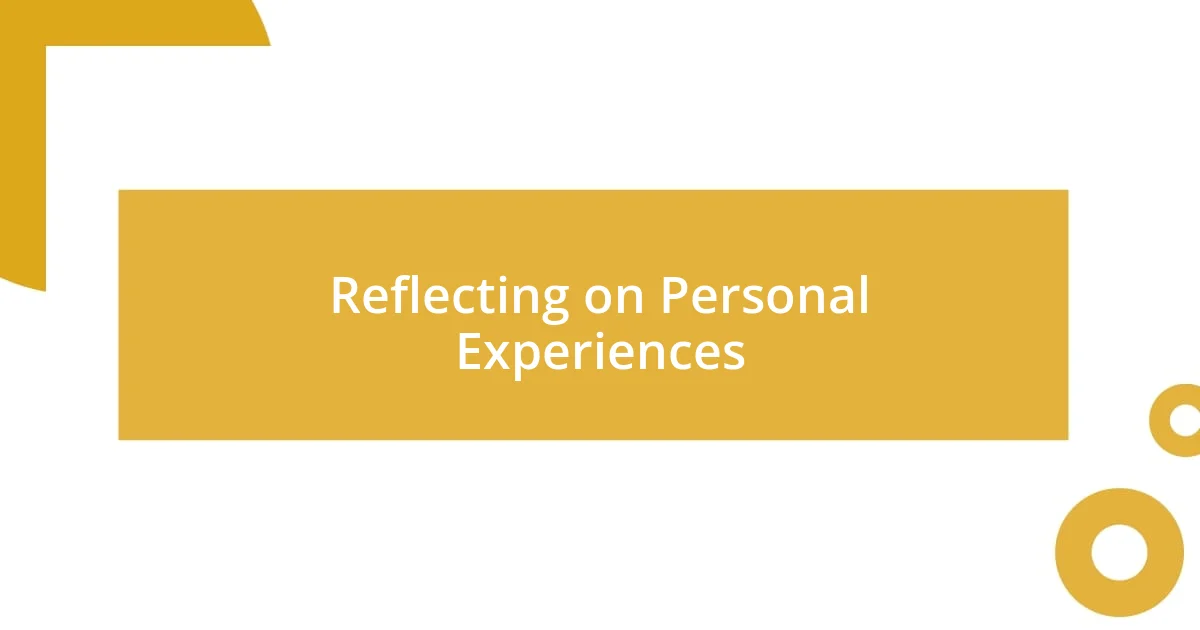
Reflecting on Personal Experiences
Reflecting on personal experiences has been an illuminating journey for me. I vividly recall my first public hearing; I approached with so much eagerness but left feeling somewhat deflated. The weight of my nerves had overshadowed my initial excitement, stirring up emotions that revealed how deeply I cared about the issues discussed. Looking back, I realize that each hearing has shaped my understanding not just of civic engagement but of my capacity to express myself genuinely.
As I navigated more hearings, I found myself embracing those raw moments of uncertainty. I remember a particular instance where I tried to voice my concerns about local environmental policies. The moment I stepped up to speak, I was flooded with fear. But against that tide, I chose to share my personal connection to the issue — how the pollution affected my family’s health. I could feel the energy shift in the room; it reminded me how vulnerable storytelling can forge powerful bonds and inspire empathy. Have you ever noticed how sharing a personal story transforms the atmosphere, inviting others into the conversation?
Moreover, I’ve learned that reflecting on these experiences can spark growth beyond the hearing room. After each event, I took time to jot down my thoughts, analyzing what went well and what I could improve. This practice revealed a pattern — the more I engaged, the sharper my insights became. I’ve come to appreciate the value in that process, as it doesn’t just prepare me for future hearings but enriches my understanding of the collective voice we create together. Isn’t it fascinating how reflecting on our past can illuminate paths for future involvement?




